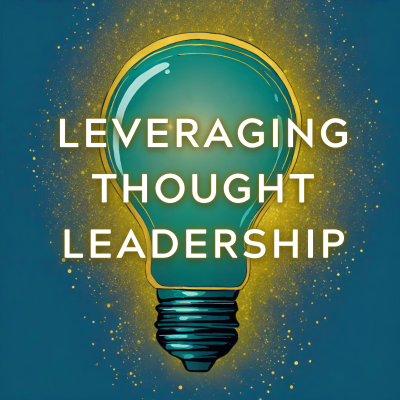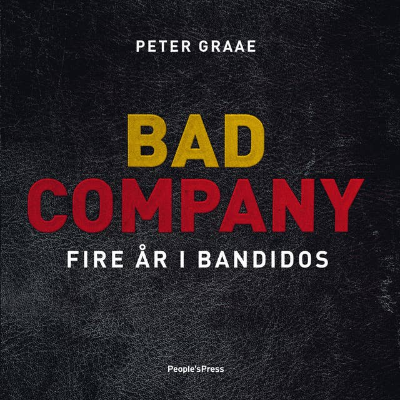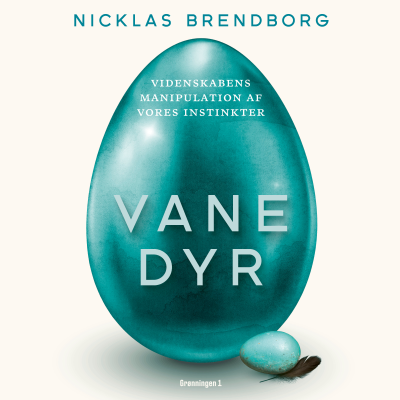
Lyt til Leveraging Thought Leadership
Podcast af Peter Winick and Bill Sherman
Welcome to the Leveraging Thought Leadership podcast, a beacon illuminating the paths and possibilities of thought leadership. With your guides, Peter Winick and Bill Sherman, we will embark on a journey into a captivating world where ideas converge with strategy and insight. Where will thought leadership take you? In each episode, we engage with thought leaders from diverse backgrounds. Whether it’s professional keynote speaking, writing your own thought leadership book, investigating the niche expertise of specialized consultants, or crossing mental swords with distinguished academics, our guests collectively paint a vivid mosaic of thought leadership's multifaceted potential. Through nuanced perspectives and rich experience, our talented co-hosts aim to offer you views of the ways independent thought leaders navigate success, elevate talent, and change company culture – while simultaneously examining how organizations harness the power of thought leadership to catalyze innovation and nurture sustainable growth. Peter Winick is your guide through the realm of independent thought leadership. For the past two decades, he has helped individuals and organizations build and grow revenue streams through designing and growing their thought leadership platforms as well as acting as a guide and advisor for increasing business to business sales of thought leadership products. Peter is the Founder and CEO of Thought Leadership Leverage. His clients come from a diverse set of backgrounds and specialties. They include New York Times bestselling business book authors, members of the Speakers’ Hall of Fame, recipients of the Thinkers50 award, CEOs of public and privately held companies, and academics at prestigious institutions such as Yale, Wharton, Dartmouth, and London School of Business. With a keen eye for detail, he delves into the intricacies of crafting personal brands, fostering genuine engagement with audiences, and expertly monetizing one's expertise. From the artistry of crafting keynote speeches that resonate with audiences to the strategic deployment of bestselling books as conduits for inspiration and insight, Peter's guests offer a treasure trove of strategies for creating value and impact and driving revenue through thought leadership. Bill Sherman specializes in the exploration of organizational thought leadership. He examines how companies conceive, curate, and deploy thought leadership initiatives, and how those initiatives benefit the orgs and the people who work within them. Bill listens to the stories and advice of industry leaders and their triumphs within the competitive business landscape. Whether through the dissemination of white papers that shape industry discourse, webinars that educate and engage, or insightful executive blogs that offer thought leadership at the highest echelons of corporate governance, Bill's guests provide illuminating perspectives on the evolution of organizational thought leadership and its pivotal role in shaping industry paradigms and perceptions. Bill concentrates on organizational consulting and business expertise, investigating organizational thought leadership and its effects, from instructional design and learning product development to marketing strategy and execution, to organizational development and transformational consulting. He enjoys working with business leaders, speakers, authors, academics, and other consultants, connecting their ideas organizational platforms and enterprise-ready product development. As the series unfolds, Peter and Bill will lead us through a nuanced exploration of the latest trends and advancements in thought leadership. From the transformative impact of technology on communication and collaboration to the evolving preferences of consumers in an increasingly digital marketplace, they will dissect the shifting landscape with precision and insight. Moreover, they will shine a spotlight on emerging modalities that are reshaping the contours of thought leadership, from the ascendance of virtual events as a cornerstone of engagement to the growing influence of social media platforms as conduits for thought dissemination and audience interaction. Through their discerning analysis, they will reveal how thought leaders can adeptly harness these trends to amplify their reach, captivate new audiences, and maximize their influence in an ever-evolving business environment. Whether you find yourself at the height of your career as a seasoned thought leader, or whether you stand at the threshold of possibility as an aspiring entrepreneur, the Leveraging Thought Leadership podcast offers an enriching voyage of discovery. Join us as we unravel the enigmatic secrets to success in the vibrant realm of thought leadership, where ideas have the power to shape perceptions, drive change, and inspire action. Together, let us explore how you, too, can engineer value, evoke impact, and cultivate revenue through the sheer power of your ideas and expertise. Welcome aboard.
Prøv gratis i 60 dage
99,00 kr. / måned efter prøveperiode.Ingen binding.
Alle episoder
641 episoderWhat’s the real reason you want to write a book? If your answer doesn’t connect directly to your business goals, you may be missing the mark. In this episode of Leveraging Thought Leadership, Peter sits down with Cathy Fyock [https://www.linkedin.com/in/cathy-fyock-973b735/], a book strategist who helps authors write the right book—the one that aligns with their business, audience, and long-term strategy. Cathy shares why writing a book should never be step one. Instead, authors must start with a solid strategy: What do you want the book to do for your business? Who exactly are you writing it for? How will you leverage it to create opportunity, revenue, or credibility? We explore the importance of aligning your book’s content and audience with your current business model. Cathy also explains why writing for “everyone” is a mistake, and why serving a clearly defined niche can lead to powerful results—even if it feels narrow. If you’ve ever wrestled with the choice between self-publishing, hybrid, or traditional publishing, Cathy breaks down the pros and cons of each. Her recommendation? Own your IP, own your margins, and stay in control. You’ll also hear surprising insights about how some authors make more from not selling books—using them as a powerful sales tool to land clients, speaking gigs, and consulting contracts. Three Key Takeaways: • Start with strategy, not writing. A successful book begins with clear goals, a defined audience, and alignment with your business model—not just a blank page and good intentions. • Niche focus drives greater impact. Writing for a well-defined, specific audience builds credibility and creates stronger results than trying to appeal to everyone. • Books are business tools, not just products. The real ROI often comes not from book sales, but from using the book to generate leads, secure speaking engagements, or land high-value clients. If you found value in the strategic insights shared in this episode, you won't want to miss our conversation with Becky Robinson [https://beckyrobinson.com/]: "Writing a Book As an Extension of Your Business [https://thoughtleadershipleverage.com/writing-a-book-as-an-extension-of-your-business-becky-robinson/]." Becky, the founder and CEO of Weaving Influence [https://weavinginfluence.com/], delves into how authors can seamlessly integrate their books into their broader business strategies. She shares practical advice on launching a book, building a lasting platform, and ensuring your message reaches the right audience over time. This episode is a must-listen for anyone looking to amplify their thought leadership and make their book a cornerstone of their business growth.
When the world stopped getting its stuff, why did supply chain suddenly matter? In this episode, Peter Winick speaks with Kerim Kfuri [https://www.linkedin.com/in/kerimkfuri/], global entrepreneur, author of "Supply Chain Ups and Downs [https://www.amazon.com/Supply-Chain-Downs-Kerim-Kfuri/dp/B0DGBVG1JC/]," and CEO of Atlas Network [https://theatlasnetwork.com/]. Kerim reveals why he stepped into thought leadership—especially when his industry became the center of public attention overnight. Kerim discusses how the COVID-19 pandemic exposed significant gaps and misunderstandings about supply chain processes. He shares insights into why investing in thought leadership provided not just visibility but also credibility, distinguishing his company from competitors who focused solely on price. Learn how Kerim leveraged his expertise to educate and inform, turning a complicated topic into accessible knowledge. He explains how thought leadership helped him open doors, win larger clients, and attract top talent. Kerim also shares practical advice for businesses aiming to use thought leadership strategically, emphasizing patience, clear metrics, and the power of investing in yourself and your business. Are you ready to turn your expertise into your greatest competitive advantage? Three Key Takeaways: • Thought leadership is a powerful differentiator. It helps smaller companies compete against larger players by showcasing unique expertise and credibility. • Education builds trust. By making complex topics like supply chain more understandable, you position yourself as a go-to authority in your field. • ROI takes time. Thought leadership isn't a quick win—it's a long-term investment that pays off through visibility, client acquisition, and talent attraction. If you found Kerim Kfuri's insights on leveraging thought leadership to elevate brand credibility and attract top clients compelling, you'll appreciate Episode 23 [https://thoughtleadershipleverage.com/leveraging-thought-leadership-peter-winick-episode-23-erica-dhawan/] of the Leveraging Thought Leadership podcast, featuring Erica Dhawan [https://ericadhawan.com/]. Erica, a leading authority on 21st-century collaboration and CEO of Cotential, discusses model building, content development, and business growth. She shares how she developed assessment tools with a data-driven mindset and translated that data into targeted sales strategies. Both episodes highlight the transformative power of thought leadership in distinguishing a brand and driving business success
Are you spending your resources wisely to amplify your thought leadership—or just making noise? In today's fast-paced marketplace, standing out from the crowd is tougher than ever. Peter Winick is joined by Paige Velasquez Budde [https://www.linkedin.com/in/paigevelasquez/], CEO at Zilker Media [https://zilkermedia.com/], one of Austin's fastest-growing agencies specializing in building people-driven brands. Paige shares insights from her extensive experience working with top global thought leaders and brands. Discover why your personal brand matters even more than your corporate identity. Paige explains how trust and connection are built person-to-person, especially in high-touch B2B environments. As the best-selling author of "Strategic Business Influencer: Building a Brand with a Small Budget [https://www.amazon.com/Strategic-Business-Influencer-Building-Budget/dp/1637747705/]" she emphasizes the importance of starting early—well before your next book or major event—to consistently showcase your expertise and build trust at scale. We dive into actionable strategies like narrowing your social media presence to the most impactful platform and harnessing the true value of PR through intentional, targeted micro-media placements. Plus, Peter and Paige unpack why vanity metrics won't help your business, and why an interview on the right niche podcast can sometimes be worth far more than a big-name media hit. Tune in to learn how to strategically build thought leadership that grows your revenue, enhances your credibility, and sustainably supports your long-term business objectives. Three Key Takeaways: • Start Early, Not Later: Building effective thought leadership isn’t about a one-time launch event; it's a consistent, ongoing practice. Start cultivating your brand now—well ahead of your next big milestone—to build trust, visibility, and credibility at scale. • Micro-Media Outperforms Vanity Metrics: Don’t chase big audiences for the sake of numbers. A targeted podcast or niche publication with the right listeners can deliver far greater business impact than generic exposure. • Your Personal Brand Matters Most: Clients Google people, not logos. Invest in clearly showcasing your personal expertise online to accelerate trust, strengthen relationships, and differentiate yourself from competitors. Looking to enhance your personal brand and build authentic relationships in the digital space? Our conversation with Paige Velasquez Budde emphasized the power of strategic PR and personal branding. To further explore building high-profile relationships through authenticity and trust, listen to our episode with Clemence Sop [https://www.linkedin.com/in/clemence-sop/]—Cultivating High-Profile Relationships in a Digital World [https://thoughtleadershipleverage.com/cultivating-high-profile-relationships-in-a-digital-world/]. Together, these episodes offer valuable insights into creating a strong personal brand and fostering meaningful connections. Ready to implement these strategies? Contact Thought Leadership Leverage [https://thoughtleadershipleverage.com/strategy-session/] today to develop a personalized plan that amplifies your impact and accelerates your success.
Does thought leadership belong only to bold personalities and charismatic speakers? Christina Wedgwood [https://www.linkedin.com/in/christina-wedgwood/] doesn't think so. In her book, "Better: A More Authentic Path for the Reluctant Thought Leader" [https://www.amazon.com/Better-authentic-reluctant-thought-leader/dp/1738620166/], Christina explores how deep thinkers, perfectionists, and even those uneasy about taking center stage can still powerfully shape ideas and conversations. In this conversation, Christina explains that thought leadership isn't about how loudly you speak—it's about clarity, simplicity, and authenticity. She argues that true impact comes from quiet, deliberate thinkers whose insights might otherwise go unnoticed. Christina reveals why "better" does not mean "louder," encouraging thought leaders to embrace their unique strengths rather than fitting into preconceived molds. Christina and Bill also delve into the emotional journey of creating thought leadership content. They discuss perfectionism and the common barrier of feeling "not ready yet," offering strategies to move past these hurdles and confidently share ideas. Christina emphasizes the importance of thinking partners—trusted individuals who challenge your thoughts and help refine your message. Drawing from her extensive experience coaching [https://www.intelligent.ink/] authors and developing thought leadership content, Christina shares valuable lessons from writing her own book. She reflects on the vulnerability required to bring deep, authentic ideas to an audience and provides insights into sustaining impactful thought leadership over time. Whether you're reluctant or ready to embrace your role, this episode offers practical advice for creating meaningful, enduring thought leadership. Three Key Takeaways: • Thought Leadership Isn’t Only for Extroverts. Christina emphasizes that thought leadership isn't exclusive to big personalities who dominate stages. Her book, Better: A More Authentic Path for the Reluctant Thought Leader, opens doors for quieter, more introspective thinkers, perfectionists, and those hesitant to step into the spotlight, empowering them to share their meaningful ideas. • Better Does Not Equal Louder. Authentic and powerful thought leadership is not about being the loudest voice in the room. Instead, it's about clarity, simplicity, and genuine insight. Christina challenges the myth that louder equates to better, advocating instead for thoughtful reflection and deliberate expression as essential traits of true thought leadership. • Embrace Imperfection and Take Action. Many aspiring thought leaders delay sharing their ideas because they're waiting for perfection—one more book, another certification, or additional case studies. Christina advocates for getting your ideas out of your head and into the world, embracing vulnerability, and taking actionable steps even when conditions aren't "perfect." If you found our discussion on authentic thought leadership engaging, you might also appreciate our episode featuring Simon Leslie, CEO and Founder of Ink Global. In "An Authentic Voice in Thought Leadership [https://thoughtleadershipleverage.com/authentic-thought-leadership-simon-leslie/]," Simon shares how publishing his book, There Is No F in Sales, transformed his business and personal growth. He delves into the importance of using one's authentic voice in thought leadership and the unexpected opportunities that arise from it. Tune in to explore how embracing authenticity can amplify your impact in the thought leadership arena.
What if the secret to extraordinary sales success wasn't pressure—but purpose? Lisa McLeod [https://www.mcleodandmore.com/] believes the best salespeople aren't chasing quotas. They're chasing impact. Lisa is a bestselling author of "Selling with Noble Purpose [https://www.mcleodandmore.com/selling-with-noble-purpose/]", keynote speaker, and creator of the Noble Purpose business philosophy. Her work has reached over 2 million people on LinkedIn Learning and been featured in Harvard Business Review [https://www.mcleodandmore.com/tag/harvard-business-review/]. In this episode of Leveraging Thought Leadership, we dive deep into the heart of what drives real, sustainable sales success—and how organizations can embrace the purpose to outperform the market by 350%. We talk about the surprising results of Lisa’s research into top-performing sales teams. Spoiler alert: the best sellers aren’t ruthless closers—they’re purpose-driven professionals who genuinely care about making a difference. Lisa shares how she fused two sides of her life—sales and soul—to build a thriving thought leadership business that helps global brands like Hilton and ThyssenKrupp transform their culture from the inside out. Lisa also opens up about the business side of thought leadership. She discusses the challenges of scaling ideas across massive organizations and why turning insight into action requires more than just great content—it requires packaging, structure, and a path for others to teach it. If you're a thought leader wrestling with how to turn your big ideas into business results—or if you’re trying to bring more meaning into your work—this conversation is for you. Three Key Takeaways: • Purpose-driven sales outperform — Salespeople who focus on improving customers' lives consistently outperform their peers, proving that noble purpose is a strategic advantage, not just a feel-good concept. • Sales has an image problem — The profession is too often defined by its worst examples, but true sales success comes from empathy, trust, and a desire to serve—especially in B2B environments. • Thought leaders must sell their ideas — To create impact, you must connect your insights to the client’s pain points and speak their language; selling isn’t about being pushy, it’s about being relevant and solving real problems. If today’s conversation on purpose-driven sales sparked something for you, you won’t want to miss our episode with Mike Latch and Gregg Murphy, Scaling Sales, Not Sacrificing Quality – The AI-Driven Secret to Billion-Dollar Growth [https://thoughtleadershipleverage.com/the-ai-driven-secret-to-billion-dollar-growth/]. While Lisa McLeod explores the human side of sales—leading with empathy and purpose—Mike and Gregg dive into how organizations can scale that impact without losing what makes it effective. Together, these episodes paint a powerful picture of what modern sales success looks like: purpose at the core, with systems that support it at scale. Listen next and discover how to align purpose with process to drive real, lasting growth.
Prøv gratis i 60 dage
99,00 kr. / måned efter prøveperiode.Ingen binding.
Eksklusive podcasts
Uden reklamer
Gratis podcasts
Lydbøger
20 timer / måned



















